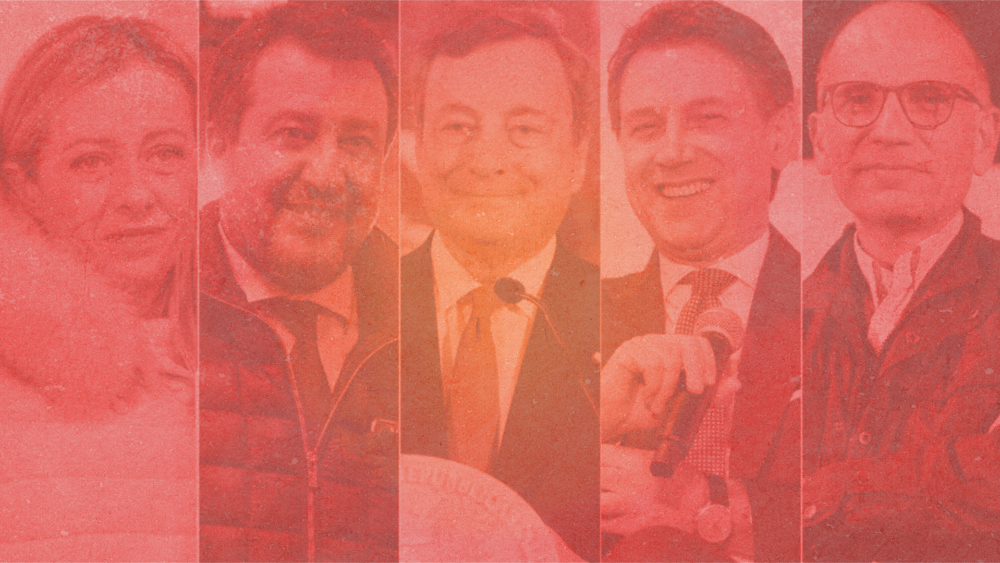As the country lies in a heap of problems, none of Italy’s leading political actors seem to be able to rise to the occasion and cater to the needs of a hurting nation
The current period that Italians are living through is certainly not the smoothest, to put it mildly: financial crises, followed by two years of a pandemic, a war in the heart of Europe, an increasingly devastating climate crisis and an economic crisis that has yet to reach its peak in terms of inflation and wages.
Yet in Italy, the only thing that seems to matter to our ruling classes is this pathetic little theatre played out by mediocre, short-sighted figures with little ability to lead our country out of an increasingly devastating situation.
On the one hand, the tame Five Star Movement (Movimento 5 Stelle), which after a phase of incredibly unprofitable pragmatism that led them to sign the blank cheque of support for the Mario Draghi government just a few months from the end of the legislature, seemingly rediscover dignity and values to reposition themselves in opposition, frightened perhaps more by DiMaio’s split and desperately looking for an excuse to not have to vote as active partners in this wretched coalition.
It is hard to understand what they expected from a government in which their delegation was – to put it mildly – of no weight and the biggest and most trumpeted ‘victory’ was supposed to be that of the establishment of a Ministry for Ecological Transition, then cunningly assigned to Roberto Cingolani, who has reached positions bordering on climate denialism and in constant battle with ‘ideological ecologism’. As well as the (unsuccessful) defence of those previously enacted measures of merit that have remained unceasingly under attack from all sides, both inside and outside the government, until they were almost definitively cancelled.
Faced with a continuous split that has seen its elected members end up in almost every group in Parliament, the outcome of a political project that was supposed to embody social anger and ended up taming it and rendering it inoffensive, cannot be seen as anything other than negative.
It was supposed to be a government of national unity but no one had too much trouble in leaving Fratelli d’Italia out of it (evidently bringing Giorgia Meloni over 23% is not such bad news for many). It is understandable that those who, like Draghi, were preparing to retrace the footsteps of his technical predecessor Mario Monti, took care not to repeat the same mistakes by fuelling a movement that, precisely in opposing that executive, is exposed on the national scene. Evidently controlling and ferrying the Five Star Movement to their political end was and remains such an important objective that it was worth sacrificing his own government and putting Italy’s National Recovery and Resilience Plan at risk, as Minister Federico D’Incà pointed out.
The others are minor players, but no less interested in the electoral gains of this theatre. Fratelli d’Italia declares the legislature over in an attempt to capitalise on polls favourable to them, the ‘moderate’ parties are pushing for Draghi’s continuation supported only by certified neo-liberal governors, the next components of a centre coalition. Lega is split between these two, between the desire to go back to labelling the government as thieves for fear of being totally consumed by the extreme right and those who would like to continue ‘administering’ the immense amount of money deriving from the emergency measures.
The country is in ruins due to this sad little theatre, metaphorically and literally.
Not one of the aforementioned actors seems to have the slightest care for the needs of a country that is going through a painful period.
Increasing inequalities in the world of work linked to gender and age, pensions destined to be reduced, the devastating impact of the pandemic and war in Ukraine, an increase in poverty, coupled with drought, a state of continuing climate emergency.
Finally, the Partito Democratico is anything but free of responsibility, as its senator Tommaso Cerno recalls. It is half afraid of losing the reins on the Movement that allowed it a tight control over the competition on the left and make them co-responsible and co-rulers of the dissolution of the same policies that they had implemented, and half anxious and trembling to strike the final blow to the many hated ‘populists’ who reminded us daily how serious was their betrayal of the workers and the environment of which they made themselves the flag bearers a few years ago.
After the migrant crisis, the pandemic and the war, our newspapers have found a new topic to fill the front pages and talk about something else while the daily problems of Italians remain unresolved.
Day after day, the loopholes in this system are opening wider and wider to swallow up more and more citizens, both Italian and European, while no political representative even dares to question its ideological foundations, which day after day are becoming more and more evident and blatantly wrong.
For this reason, discontent and despair in society is growing more and more into a state of necessary agitation, with an ever-increasing distrust of current policy. The people are ready to return to the struggle in search of a worthy and legitimate representation that could allow a real change of course.
This is the only and last chance to avoid ending up definitively in the abyss, while those at the helm of this country continue to turn a blind eye.
Do you want to be informed of DiEM25's actions? Sign up here















